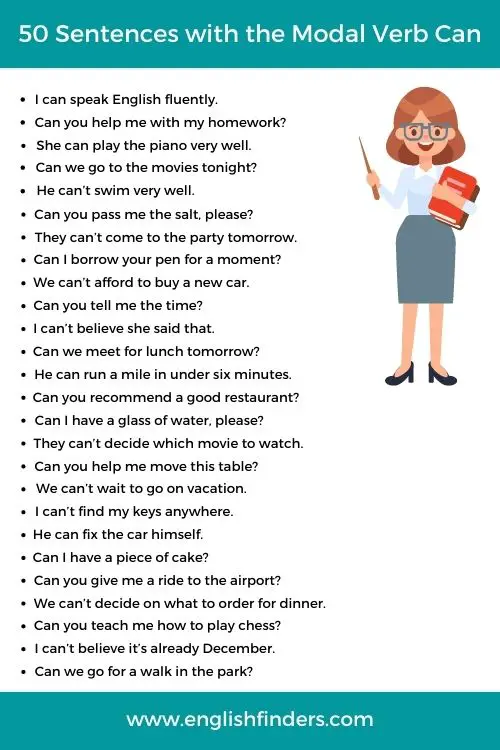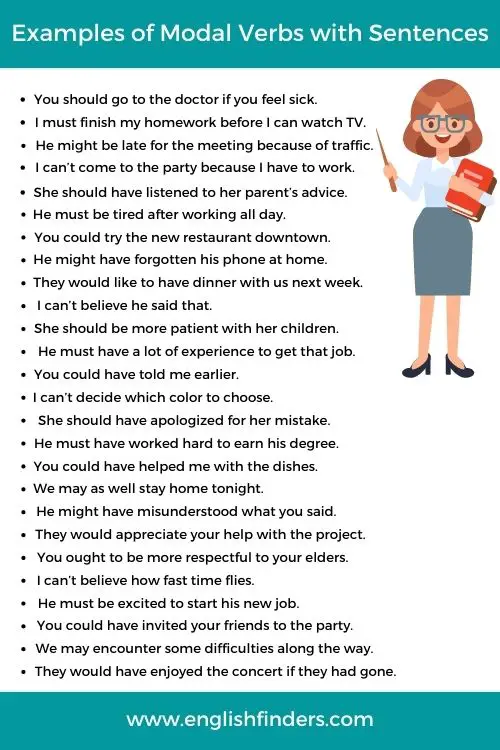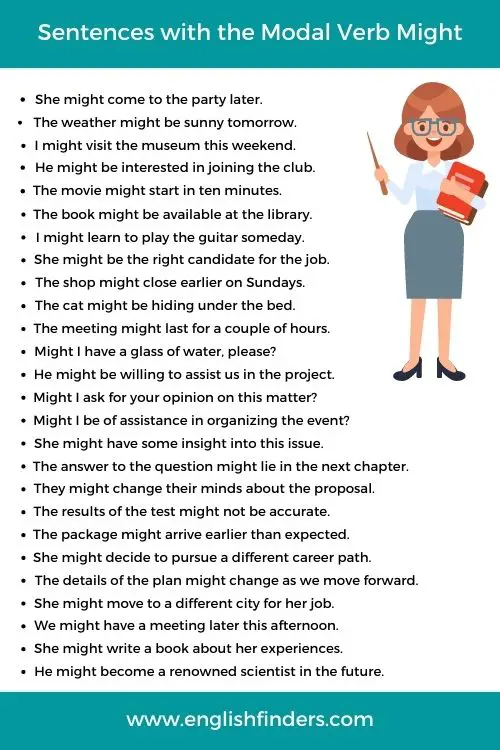Last updated on June 15th, 2025 at 10:16 pm
The modal verb “can” is used to indicate ability, possibility, or permission. It is a very useful verb that can be used in a variety of contexts. To use “can” in a sentence, simply place it before the main verb. For example, “I can swim,” “She can speak Spanish,” or “They can come to the party.”
“Can” can also be used in questions such as “Can you help me?” or “Can we go to the school?” It is important to note that “can” is used for present tense and future tense situations, but not for past tense situations. In this lesson, we will provide you with 50 sentences with the modal verb “can” to help you better understand its usage.
What Is the Modal Verb “Can”?
The word “can” is a modal verb in English. Modal verbs are helping verbs that come before the main verb to show ability, permission, possibility, or a polite request. “Can” is one of the most commonly used modal verbs in everyday conversations.
Let’s break down the main uses of can:
✅ 1. To Show Ability
We use can to talk about what someone is able to do.
Example:
- She can play the piano.
(This means she has the ability to play the piano.)
✅ 2. To Ask or Give Permission
Can is often used when asking for or giving permission.
Example:
- Can I go outside now?
(Here, someone is asking for permission.)
✅ 3. To Show Possibility
Sometimes, we use can to talk about something that is possible.
Example:
- It can get very cold in December.
(This means it’s possible for the weather to be cold.)
✅ 4. To Make a Request or Offer
We also use can to ask someone politely or offer help.
Example:
- Can you help me with my homework?
(This is a polite request.)
3. Usage Rules for “Can” (Quick Guide)
Using “can” correctly in a sentence is easier than you might think. It always comes before the base form of the main verb (the verb without “to”). Below are some quick grammar rules and structures that will help you speak and write with confidence.
✅ Basic Sentence Structures with “Can”:
| Type | Structure | Example |
|---|---|---|
| Positive | Subject + can + base verb | I can ride a bike. |
| Negative | Subject + can’t + base verb | She can’t speak French. |
| Question | Can + subject + base verb? | Can he come with us? |
✅ Key Rules to Remember:
- Use the base verb after “can”
✘ She can to swim.
✔ She can swim. - “Can’t” is the short form of “cannot”
Both mean the same, but “can’t” is more common in everyday English.
✔ I can’t eat spicy food. - In questions, “can” comes first
✔ Can you help me? - Do not add “s,” “ed,” or “ing” to the verb after “can”
✘ He can sings well.
✔ He can sing well.
50 Sentences with the Modal Verb Can
To help you fully understand how to use “can” in real situations, we’ve divided these 50 example sentences into five helpful categories. Each group shows a different way that can be used in everyday English. These examples are short, simple, and perfect for English learners.
🟢 A. Can for Ability (10 Sentences)
We can use “can” to talk about what someone is able to do.
- I can ride a bicycle without falling.
- She can speak three languages.
- We can solve this problem together.
- He can cook delicious meals.
- They can draw really well.
- My brother can run very fast.
- I can sing, but I’m a little shy.
- You can lift that box if you try.
- The baby can walk now.
- Our teacher can explain things clearly.
🟡 B. Can for Permission (10 Sentences)
We can use “can” to ask for or give permission.
- Can I go to the bathroom, please?
- You can borrow my pen.
- Can we play outside after lunch?
- She can stay here tonight.
- Can I have another cookie?
- Students can use the library after school.
- Can I watch TV now?
- You can sit wherever you like.
- Can we take a short break?
- My parents said I can go to the party.
🔵 C. Can for Possibility (10 Sentences)
We can use “can” to show that something is possible.
- It can rain later, so bring an umbrella.
- Accidents can happen anytime.
- You can get sick if you don’t rest.
- Too much noise can be harmful.
- This phone can break easily.
- A simple idea can change the world.
- Learning English can be fun.
- The road can get slippery when wet.
- Problems can be solved with teamwork.
- Anyone can win if they try hard enough.
🟣 D. Can for Requests/Offers (10 Sentences)
We can use “can” to make polite requests or offers.
- Can you help me with this question?
- Can I carry that bag for you?
- Can you pass the salt, please?
- Can we talk after class?
- Can I call you later?
- Can you show me how to do this?
- Can we meet tomorrow?
- Can I join your group?
- Can you tell me the time?
- Can I open the window?
🟠 E. Mixed Usage (10 Sentences)
These show a mix of all the above uses.
- He can swim, but he can’t dive.
- Can you believe this news?
- I can try again if I fail.
- She can stay up late on weekends.
- We can go to the park if it doesn’t rain.
- You can’t bring pets into the store.
- Can your sister come too?
- I can see the stars from my window.
- He can’t eat peanuts; he’s allergic.
- Can anyone solve this riddle?
Final Thoughts
As you’ve seen in these 50 sentences with the modal verb can, it helps you express ability, ask for permission, talk about possibility, and make requests or offers. We hope these examples have helped you better understand the usage of the modal verb “can.” Remember, practice makes perfect, so don’t be afraid to use this verb in your homework and everyday conversations.
Frequently Asked Questions
What type of verb is “can” in English?
“Can” is a modal verb. It is used to express ability, ask for permission, show possibility, or make polite requests. It always comes before the base form of the main verb.
Example: She can dance.
Can “can” be used in the past tense?
Not directly. The past form of “can” is “could.”
Example:
Present: I can swim.
Past: I could swim when I was five.
What is the difference between “can” and “could”?
Both are modal verbs, but “can” is used for the present or general situations, while “could” is used for the past or to sound more polite.
Examples:
Can you help me? (present)
Could you help me? (more polite or past)

Azizul Hakim is the founder & CEO of englishfinders.com. He is a passionate writer, English instructor, and content creator. He has completed his graduation and post-graduation in English language and literature.




